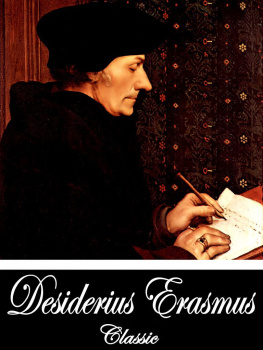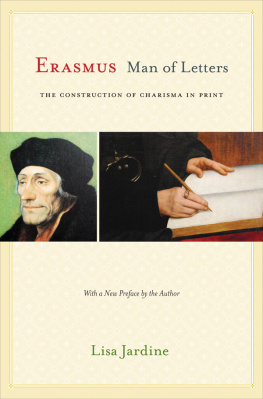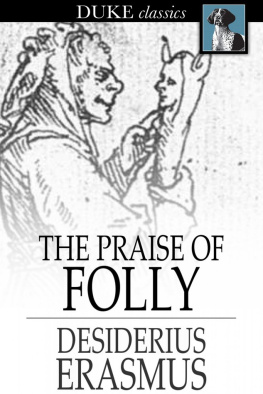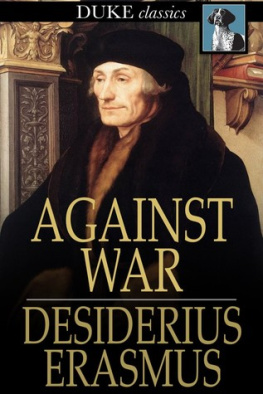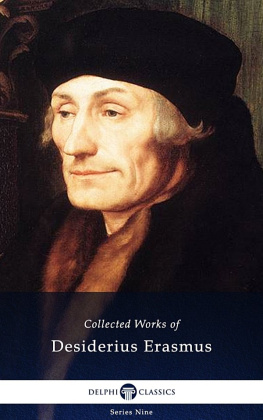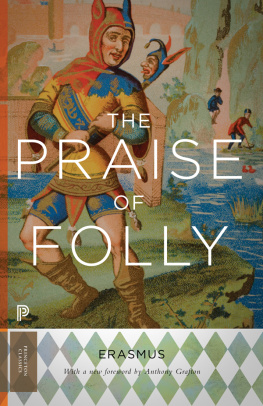Erasmus Desiderius - Selections
Here you can read online Erasmus Desiderius - Selections full text of the book (entire story) in english for free. Download pdf and epub, get meaning, cover and reviews about this ebook. genre: Science. Description of the work, (preface) as well as reviews are available. Best literature library LitArk.com created for fans of good reading and offers a wide selection of genres:
Romance novel
Science fiction
Adventure
Detective
Science
History
Home and family
Prose
Art
Politics
Computer
Non-fiction
Religion
Business
Children
Humor
Choose a favorite category and find really read worthwhile books. Enjoy immersion in the world of imagination, feel the emotions of the characters or learn something new for yourself, make an fascinating discovery.
- Book:Selections
- Author:
- Genre:
- Rating:3 / 5
- Favourites:Add to favourites
- Your mark:
- 60
- 1
- 2
- 3
- 4
- 5
Selections: summary, description and annotation
We offer to read an annotation, description, summary or preface (depends on what the author of the book "Selections" wrote himself). If you haven't found the necessary information about the book — write in the comments, we will try to find it.
Selections — read online for free the complete book (whole text) full work
Below is the text of the book, divided by pages. System saving the place of the last page read, allows you to conveniently read the book "Selections" online for free, without having to search again every time where you left off. Put a bookmark, and you can go to the page where you finished reading at any time.
Font size:
Interval:
Bookmark:
Project Gutenberg's Selections from Erasmus, by Erasmus Roterodamus
Copyright laws are changing all over the world. Be sure to check thecopyright laws for your country before downloading or redistributingthis or any other Project Gutenberg eBook.
This header should be the first thing seen when viewing this ProjectGutenberg file. Please do not remove it. Do not change or edit theheader without written permission.
Please read the "legal small print," and other information about theeBook and Project Gutenberg at the bottom of this file. Included isimportant information about your specific rights and restrictions inhow the file may be used. You can also find out about how to make adonation to Project Gutenberg, and how to get involved.
**Welcome To The World of Free Plain Vanilla Electronic Texts**
**eBooks Readable By Both Humans and By Computers, Since 1971**
*****These eBooks Were Prepared By Thousands of Volunteers!*****
Title: Selections from Erasmus Principally from his Epistles
Author: Erasmus Roterodamus
Release Date: June, 2005 [EBook #8400][Yes, we are more than one year ahead of schedule][This file was first posted on July 6, 2003]
Edition: 10
Language: English and Latin
*** START OF THE PROJECT GUTENBERG EBOOK SELECTIONS FROM ERASMUS ***
Produced by David Starner, Thomas Berger,and the Online Distributed Proofreading Team.
Principally From His Epistles
By
* * * * *
The selections in this volume are taken mainly from the Letters ofErasmus. Latin was to him a living language; and the easystraightforwardness with which he addresses himself to what he has tosay, whether in narrating the events of every-day life or in developingmore serious themes, makes his works suitable reading for beginners. Tothe rapidity with which he invariably wrote is due a certain laxity,principally in the use of moods and tenses; and his spelling is that ofthe Renaissance. These matters I have brought to some extent intoconformity with classical usage; and in a few other ways also I havetaken necessary liberties with the text.
In the choice of passages I have been guided for the most part by adesire to illustrate through them English life at a period of exceptionalinterest in our history. There has never been wanting a succession ofpersons who concerned themselves to chronicle the deeds of kings and thefortunes of war; but history only becomes intelligible when we can placethese exalted events in their right setting by understanding what menboth small and great were doing and thinking in their private lives. ToErasmus we owe much intimate knowledge of the age in which he lived; andof none of his contemporaries has he given us more vivid pictures than ofthe great Englishmen, Henry VIII, Colet, More, and many others, whom hedelighted to claim as friends.
With this purpose in view I have thought it best to confine thehistorical commentary within a narrow compass in the scenes which are notdrawn from England; and to leave unillustrated many distinguished names,due appreciation of which would have overloaded the notes and confusedthe reader.
The vocabulary is intended to include all words not to be found in Dr.Lewis's Elementary Latin Dictionary, with the exception of (1) thosewhich with the necessary modification have become English, (2) classicalwords used for modern counterparts without possibility of confusion, e.g. templum for church; (3) diminutivesa mode of expression whichboth Erasmus and modern writers use very freelyas to the origin ofwhich there can be no doubt.
Mr. Kenneth Forbes of St. John's College has kindly gone through thewhole of the text with me, and has given me the benefit of his longexperience as a teacher. I am also obliged to him for most valuableassistance in the preparation of the notes.
LONGWALL, COTTAGE, OXFORD. June 1908.
In a second edition I have been able to incorporate a few of thecorrections and suggestions made by reviewers and friends. My thanks areespecially due to the Warden of Wadham and to Mr. Hugo Sharpley, headmaster of Richmond Grammar School, Yorks.
23 MERTON STREET, OXFORD. June 1, 1918.
* * * * *
V. A VISIT TO COURT (I. p. 6 : i. p. 201)
XI. A VISIT TO LAMBETH (I. pp. 4-5 : i. p.393)
XIII. AN INTERVIEW WITH GRIMANI ( :i. p. 461)
(Of the figures in brackets, the first give the references to my OpusEpistolarum Erasmi, the second to the late Mr. F. M. Nichols' Epistlesof Erasmus.)
* * * * *
Erasmus of Rotterdam was born on October 27, probably in 1466. His fatherbelonged to Gouda, a little town near Rotterdam, and after some schoolingthere and an interval during which he was a chorister in UtrechtCathedral, Erasmus was sent to Deventer, to the principal school in thetown, which was attached to St. Lebuin's Church. The renewed interest inclassical learning which had begun in Italy in the fourteenth century hadas yet been scarcely felt in Northern Europe, and education was stilldominated by the requirements of Philosophy and Theology, which wereregarded as the highest branches of knowledge. A very high degree ofsubtlety in thought and argument had been reached, and in order that theyouthful student might be fitted to enter this arena, it was necessarythat he should be trained from the outset in its requirements. In theschools, in consequence, little attention was paid to the form in whichthought was expressed, provided that the thought was correct: in markedcontrast to the classical ideal, which emphasized the importance ofexpression, in just appreciation of the fact that thought expressed inobscure or inadequate words, fails to reach the human mind. The mediaevalposition had been the outcome of a reaction against the spirit of laterclassical times, which had sacrificed matter to form. And now thependulum was swinging back again in a new attempt to adjust the rivalclaims.
The education which Erasmus received at Deventer was still in thraldom tothe mediaeval ideal. Greek was practically unknown, and in Latin all thatwas required of the student was a sufficient mastery of the rudiments ofgrammar to enable him to express somehow the distinctions and refinementsof thought for which he was being trained. Niceties of scholarship andamplitude of vocabulary were unnecessary to him and were disregarded.From a material point of view also education was hampered. Printing wasonly just beginning, and there were few, if any, schoolbooks to be had.Lectures and lessons still justified their name 'readings'; for the boyssat in class crowded round their master, diligently copying down thewords that fell from his lips, whether he were dictating a chapter ingrammar, with its rules of accidence and syntax, or at a later stage apassage from a Latin author with his own or the traditional comments.Their canon of the classics was widely different from ours; instead ofthe simplified Caesar or Ovid that is now set before the schoolboy,Terence occupied a principal position, being of the first importance toan age when the learned still spoke Latin. Portions of the historianswere read, for their worldly wisdom rather than for their history; Plinythe Elder for his natural science, and Boethius for his mathematics; andfor poetry Cato's moral distiches and Baptista of Mantua, 'the ChristianVergil.'
Next pageFont size:
Interval:
Bookmark:
Similar books «Selections»
Look at similar books to Selections. We have selected literature similar in name and meaning in the hope of providing readers with more options to find new, interesting, not yet read works.
Discussion, reviews of the book Selections and just readers' own opinions. Leave your comments, write what you think about the work, its meaning or the main characters. Specify what exactly you liked and what you didn't like, and why you think so.


